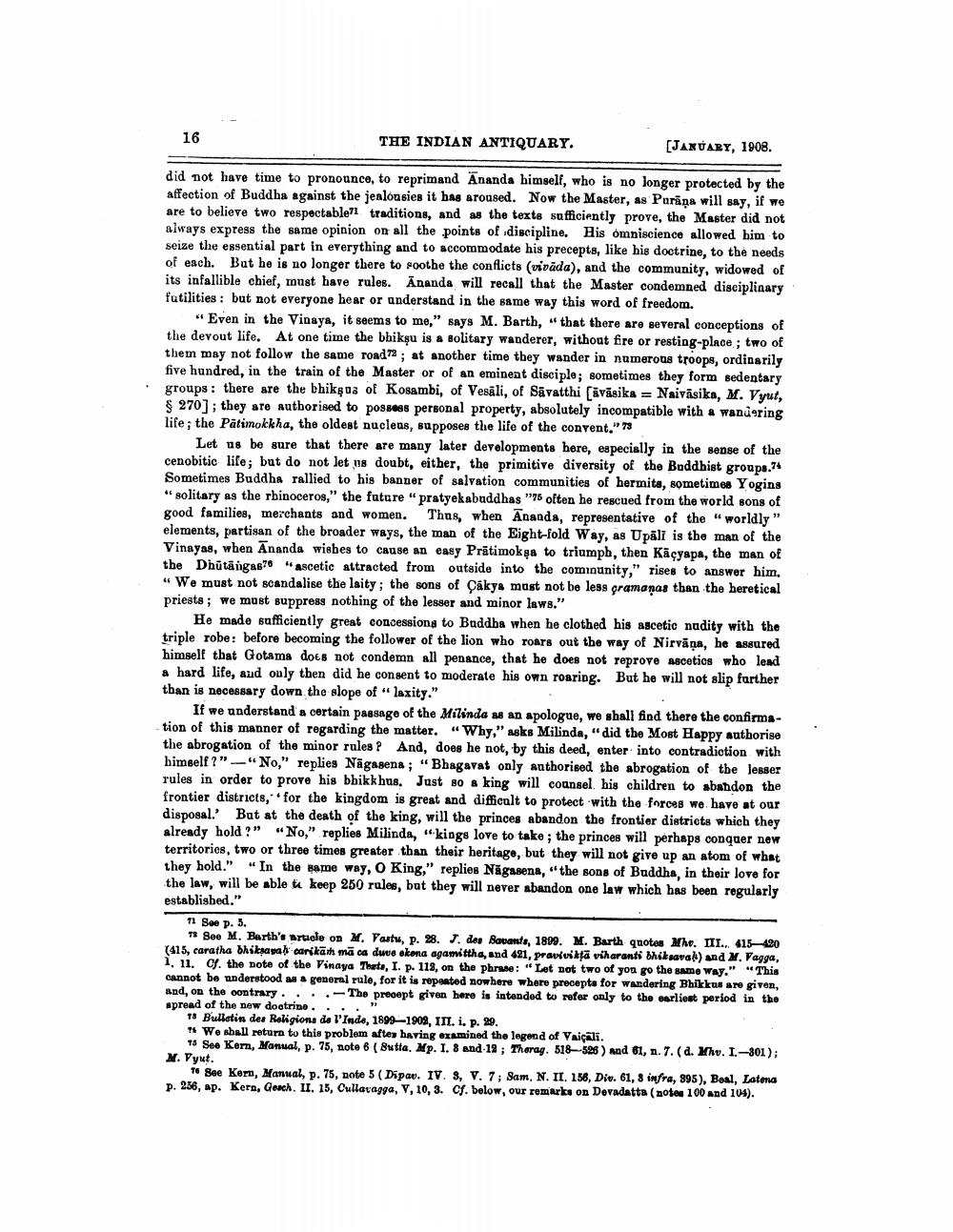________________
16
THE INDIAN ANTIQUARY.
[JANUARY, 1908.
did not have time to pronounce, to reprimand Ananda himself, who is no longer protected by the affection of Buddha against the jealousies it has aroused. Now the Master, as Parāņa will say, if we are to believe two respectable traditions, and as the texts sufficiently prove, the Master did not always express the same opinion on all the points of discipline. His omniscience allowed him to seize the essential part in everything and to accommodate his precepts, like his doctrine, to the needs of each. But he is no longer there to soothe the conflicts (vidāda), and the community, widowed of its infallible chief, must have rules. Ananda will recall that the Master condemned disciplinary futilities: but not everyone hear or onderstand in the same way this word of freedom.
"Even in the Vinaya, it seems to me," says M. Barth, “that there are several conceptions of the devout life. At one time the bhikṣu is a solitary wanderer, without fire or resting-place; two of them may not follow the same road72; at another time they wander in numerous troops, ordinarily five hundred, in the train of the Master or of an eminent disciple; sometimes they form sedentary groups: there are the bhiksua of Kosambi, of Vesāli, of Sāvatthi [avāsika = Naivasika, M. Vyut, $ 270]; they are authorised to possess personal property, absolutely incompatible with a wandering life; the Pātimokkha, the oldest nucleus, supposes the life of the convent." 73
Let us be sure that there are many later developments here, especially in the sense of the cenobitic life; but do not let us doubt, either, the primitive diversity of the Buddhist groups.74 Sometimes Buddha rallied to his banner of salvation communities of hermits, sometimes Yogins "solitary as the rhinoceros," the future "pratyekabaddhas "75 often he rescued from the world sons of good families, merchants and women. Thus, when Ananda, representative of the "worldly” elements, partisan of the broader ways, the man of the Eight-fold Way, as Upali is the man of the Vinayas, when Ananda wishes to cause an easy Prātimokşa to triumph, then Kaçyapa, the man of the Dhūtāngas76 "ascetic attracted from outside into the cominunity," rises to answer him.
We must not scandalise the laity; the sons of Çakya must not be less gramaņas than the beretical priests; we must suppress nothing of the lesser and minor laws."
He made sufficiently great concessions to Baddba when he clothed his ascetic nudity with the triple robe: before becoming the follower of the lion who roars out the way of Nirvana, be assured himself that Gotama does not condemn all penance, that he does not reprove ascetics who lead a hard life, and only then did he consent to moderate his own roaring. But he will not slip further than is necessary down the slope of " laxity."
If we understand a certain passage of the Milinda as an apologue, we shall find there the confirmation of this manner of regarding the matter. "Why," asks Milinda, "did the Most Happy authorise the abrogation of the minor rules? And, does he not, by this deed, enter into contradiction with himself?"-"No," replies Nägasena ; " Bhagavat only authorised the abrogation of the lesser rules in order to prove his bhikkhus. Just so a king will counsel his children to abandon the frontier districts,* . for the kingdom is great and difficult to protect with the forces we have at our disposal.' But at the death of the king, will the princes abandon the frontier districts which they already hold ?" "No," replies Milinda, “kings love to take; the princes will perhaps conquer new territorios, two or three times greater than their heritage, but they will not give up an atom of what they hold." "In the same way, 0 King," replies Nāgasena, "the sons of Buddha, in their love for the law, will be able to keep 250 rules, but they will never abandon one law which has been regularly established."
71 See p. 5.
72 See M. Barth's article on M. Vastu, p. 28. J. der Bauanta, 1899. M. Barth quotes Mhe. III... 415-420 (415, caratha bhiksagah carikāt māca duue ekona agamith, and 421, pravviktā viharanti bhiksaval) and M. Vagga, 1. 11. Cf. the note of the Vinaya Theta, I. p. 118, on the phrase: "Let not two of you go the same way." "This cannot be understood ma general rule, for it is reported nowhere where precepta for wandering Bhikkus are given, and, on the contrary .... The precept given here is intended to refer only to the earliest period in the spread of the new doctrine....
18 Bulletin des Religions de l'Inde, 1899-1909, III. i. p. 29. * We shall return to this problem after having examined the legend of Vaicali.
*See Kem, Manual, p. 75, note 8 (Butta. Mp. I. 8 and 19; Thorag. 518-528 ) And 61, n. 7. (a. Whu. 1.-301 ); M. Vyut.
** See Kern, Manual, p. 75, note 3 (Dipar. IV. , V. 7; Sam. N. II. 156, Div. 61, 8 infra, 895), Baal, Latona p. 256, ap. Kern, Gouch. II. 15, Oullavagga, V, 10, 3. cf. below, our remarks on Dovadatta (note 100 and 104).




